Department News
Highlighting Carolina Graduate Historians at the 2023 Annual Convention of the Association for Slavic, East European, and Eurasian Studies in Philadelphia, PA
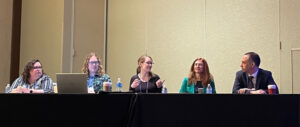
Historians of the University of North Carolina at Chapel Hill took on the 2023 Annual Convention of the Association for Slavic, East European, and Eurasian Studies (ASEEES) in exceptionally strong numbers. Presenting their work, chairing panels, and commenting on new research of their colleagues, nine Carolina historians—three faculty members (Chad Bryant, Karen Auerbach, Eren Tasar) and six graduate students—participated in the total number of twelve panels.
This year’s convention, which took place from November 30 to December 2 in Philadelphia, celebrated the 75th anniversary of ASEEES, the largest international scholarly society advancing knowledge about Central Asia, the Caucasus, Russia, and Eastern Europe, with the theme of decolonization. Calling for the re-evaluation of long-established hierarchies, the organizers encouraged scholars to explore decolonization as a contemporary and historical force and to reexamine the power relationships embedded in our research, professional practices, and teaching.
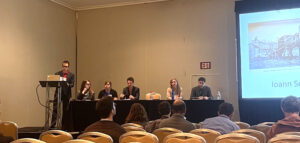
Luke Jeske kicked off the UNC line-up with his presentation on pilgrimages of Russian Orthodox Christians to the Holy Lands in the second half of the long 19th century. His paper shed light on the emerging institutional support of these voyages, pointing to institutional relationships of collaboration and contestation. He argued that studying the origins of pilgrimage as a modern mass phenomenon reveals broader trends of increasing mobility both within the Russian Empire and beyond it.
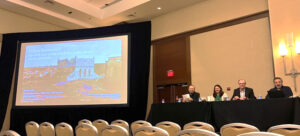 Oskar Czendze also captured the audience’s attention with a story of migration. Examining the ways in which Jewish immigrants in New York’s Lower East Side imagined their former homeland, the Habsburg province of Galicia, Czendze highlighted the ways in which the First World War functioned as a catalyst in Galicia’s reinvention as a place of Jewish pride. In doing so, he highlighted the integrating force of regionalism for the creation of American-Jewish identity among Galician Jewish immigrants.
Oskar Czendze also captured the audience’s attention with a story of migration. Examining the ways in which Jewish immigrants in New York’s Lower East Side imagined their former homeland, the Habsburg province of Galicia, Czendze highlighted the ways in which the First World War functioned as a catalyst in Galicia’s reinvention as a place of Jewish pride. In doing so, he highlighted the integrating force of regionalism for the creation of American-Jewish identity among Galician Jewish immigrants.
Seeking to reframe fundamental questions of Habsburg military history, Kevin Hoeper examined how the Habsburg army sought to popularize mandatory military service in the late nineteenth and early twentieth centuries. Examining sources from the Czech lands, Hoeper focused on the army’s idealized rhetoric of the “local regiment” as a propagandistic instrument. The goal was to frame mandatory military service as a familial birthright and an exercise in local patriotism. In the end, he argued, the “local regiment” evolved into a flexible tool for appealing to the military-aged youth of the multinational empire.
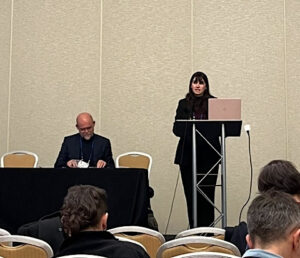
Moving into the age of extremes, Tess Megginson’s paper focused on the Czech mapmaker Viktor Dvorský and the ways in which he constructed his geographical imagination of an independent Czech and Slovak state during the First World War. Megginson analyzed his publications leading up to 1918 to examine how Czech nationalist discourse entered his thinking as he created arguments for the geographical basis for an independent Czechoslovak state. Overall, she argued that Czech mapmakers revolutionized mental maps at a time when borders seemed malleable and fluid.
Examining the impact of the new borders, Zora Piskačová demonstrated the rather tense relationship between the municipal leaders of Polish Cieszyn and Czech Český Těšín and their respective nation-states. She presented alongside Tereza Juhászová—a result of the international cooperation between the History Department at UNC-CH and the Institute of International Studies at Charles University in Prague (Czechia) instigated by Professor Chad Bryant. Piskačová was also awarded the Graduate Student Research Award of the Polish Studies Association during their annual meeting.
Finally, turning to the period following the Second World War, Mira Markham introduced her work on communist attempts to appropriate the 9th century figures of Byzantine Christian theologians and missionaries, Sts. Cyril and Methodius, as pillars legitimizing the Stalinist order in the early 1950s. Markham’s paper revealed the relative flexibility of the Czechoslovak communist regime in its early years and highlighted a particular and often overlooked Moravian Catholic vision of the Czech national identity.
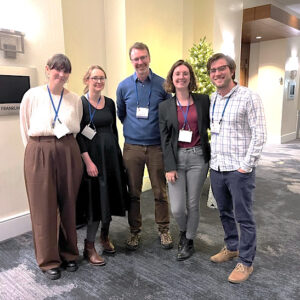
All in all, the convention was valuable to the Carolina historians beyond the chance to present their work. “It was my first time attending ASEEES, and I’m so grateful to have gone,” says Tess Megginson. “It was a little overwhelming at first since it was like seeing my bookshelf come to life in front of me… But I was surprised at how approachable and generous everyone was with their time. It was great to meet scholars I’ve looked up to for some time, as well as other graduate students who could give advice on navigating conferences like this. I’m already counting down the days until next year in Boston!” Indeed, quite of few of this year’s attendees are already planning panel for the 2024 Annual Convention which will take place in Boston, MA—see you all there!
-Zora Piskačová
I’d like to thank Tess Megginson and Oskar Czendze for sharing their photos with me.
Professor Lloyd Kramer Retires
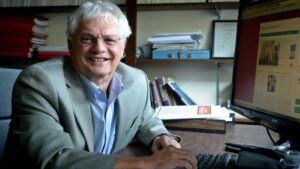 Longtime chair of the department and a fixture of the history faculty, Dr. Lloyd S. Kramer, plans to retire this year. It is fitting, then, that we take a moment to appreciate someone who has had a profound impact on this department, this university, and beyond.
Longtime chair of the department and a fixture of the history faculty, Dr. Lloyd S. Kramer, plans to retire this year. It is fitting, then, that we take a moment to appreciate someone who has had a profound impact on this department, this university, and beyond.
Dr. Kramer began his academic career as an undergraduate at Maryville College (1971) before going on to get his master’s at Boston College (1973) and his Ph.D. at Cornell University (1983). He served as a lecturer at Stanford University from 1983 to 1984 and then joined the faculty at Northwestern University from 1984 to 1986. In 1986, he accepted a position here at UNC Chapel Hill, becoming an Associate Professor in 1989 and a Full Professor in 1995.
While at Chapel Hill, Dr. Kramer has been a prominent presence in our department, both inside and outside the classroom. As a professor, Dr. Kramer has taught a variety of classes focused on European history, intellectual history, nationalism, and Atlantic history. He has also guided many graduate students to successful Ph.D’s. As a professor, Dr. Kramer said that he “felt very engaged by people in the History Department and by the graduate students who came here, by the undergraduate students who took history courses. I really like teaching North Carolina students.”
Beyond his role as a professor, Dr. Kramer also served as the History Department Chair starting in 2004. He served in that role until 2013. As chair, Dr. Kramer expanded the History Department, hiring around 25 new professors. This augmented the department’s scope on a global scale, marking a departure from its traditional strengths in European and American history. Dr. Kramer also played a big part in helping fund the department through private donors, as the resources for graduate students did not keep up with the department’s needs. This was due to various factors, including the 2009 recession and changes in state legislative priorities. This new funding was used for graduate research and summer funding, and helped lay the groundwork for later support from alumni, notably the Mark Clein funds.
Central to Dr. Kramer’s work as an intellectual and educator has been public awareness, outreach, and engagement. For this reason, his leadership roles have been varied. After working mainly in the department for the first five or so years, he became Associate Director of the Institute for the Arts and Humanities in 1992. He held that position for a number of years, and then in 1994-95 served as Acting Director while Director Ruel Tyson went on leave. He later served again as Associate Director at the IAH for some time in the early 2000s.
After completing his tenure as Department Chair, Kramer became Director of the Program in the Humanities and Human Values in 2014. The program changed its name to Carolina Public Humanities in 2017. In this prominent leadership role, Dr. Kramer continued to broaden his own and others’ horizons. Dr. Kramer explains that Carolina Public Humanities seeks to connect North Carolina, especially schoolteachers, with UNC faculty to help facilitate conversations and learning. This work includes a variety of programs, such as seminars, workshops for public school teachers, partnerships with community colleges, and public events. Its activities advance UNC’s mission to promote “knowledge-based services and other resources of the University to the citizens of North Carolina and their institutions to enhance the quality of life for all people in the State.” As a professor, Dr. Kramer has sought to inform the North Carolina public through a variety of public-facing activities, such as writing articles for the Raleigh News and Observer on subjects like the Marquis de Lafayette, the First World War, and historical French-American relations. He also has appeared several times on WCHL radio to discuss how a grounding in the humanities can better inform historical and current events.
In recent times, there have been questions about the value of history education to students in the modern world. Still, Dr. Kramer may have put it best in his speech to the graduating class of the History Department in 2021 when he said: “Even more important, perhaps, historical perspectives also prepare you for that year after you lose your first good job, or for that year in which you mourn the painful loss of a special relationship, or for that year in which you learn that you are seriously ill, or for that year in which every candidate you supported loses in the elections. Historical education, in short, gives you perspectives that help you move forward during the most difficult years of your life.” Dr. Kramer has given that perspective to generations of students and I for one, will forever be grateful that he did that here at UNC.
-James Britt
Accolades
Gifts to the History Department
The History Department is a lively center for historical education and research. Although we are deeply committed to our mission as a public institution, our “margin of excellence” depends on generous private donations. At the present time, the department is particularly eager to improve the funding and fellowships for graduate students.
Your donations are used to send graduate students to professional conferences, support innovative student research, bring visiting speakers to campus, and expand other activities that enhance the department’s intellectual community.
 |
To make a secure gift online, please click “Give Now” above.
The Department also receives tax-deductible donations through the Arts and Sciences Foundation at UNC-Chapel Hill. Please note in the “memo” section of your check that your gift is intended for the History Department. Donations should be sent to the following address:
UNC-Arts & Sciences Foundation
Buchan House
523 E. Franklin Street
Chapel Hill, NC 27514
Attention: Ronda Manuel
For more information about creating scholarships, fellowships, and professorships in the Department through a gift, pledge, or planned gift please contact Ronda Manuel, Associate Director of Development at the Arts and Sciences Foundation: ronda.manuel@unc.edu or (919) 962-7266.
